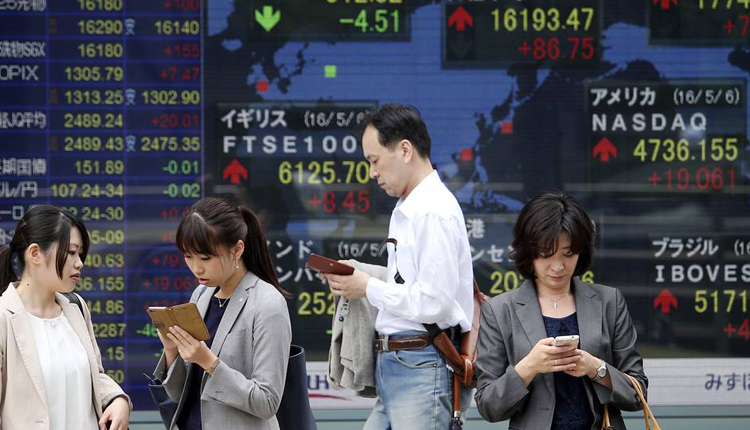Asian stocks traded mixed on Monday as Brexit developments over the weekend created further uncertainty over the United Kingdom’s impending departure from the European Union.
In Japan, the Nikkei 225 rose 0.23 percent while the Topix index added 0.41 percent. South Korea’s Kospi gave up early gains to trade near flat while Australia’s ASX 200 dipped 0.1 percent.
Mainland Chinese shares traded down: The Shanghai composite fell 0.51 percent, the Shenzhen composite was down 0.52 percent and the Shenzhen component lost 0.11 percent.
In Hong Kong, the Hang Seng index advanced 0.17 percent.
Overall, MSCI’s broadest index of Asia shares outside Japan rose 0.19 percent.
“Global markets and political events appear to be in the “half-full” mode, whereby outcomes are not altogether dire; even if some degree of uncertainty and risks linger,” Vishnu Varathan, head of economics and strategy at Mizuho Bank, wrote in a morning note.
Brexit delay
U.K. Prime Minister Boris Johnson was thwarted by a cross-party group of politicians in Parliament who voted to postpone the meaningful vote on his new Brexit deal. That forced Johnson to ask Brussels for an extension to the current October 31 departure deadline, but EU leaders don’t necessarily have to accept it.
This week, the British government will present the full Withdrawal Agreement Bill to try and pass it through both the upper and lower houses of Parliament. A decisive vote by lawmakers would likely come later in the week.
The pound is likely to remain somewhat volatile, but supported, because it appears the chances of a hard (no deal) Brexit are very slim, and either another Brexit delay, or the ratification of the new Withdrawal Agreement in the U.K. House of Commons, will occur this week, currency strategists at the Commonwealth Bank of Australia wrote in a morning note.
The British pound changed hands at $1.2916, climbing from an earlier level around $1.2873 but lower than its previous close at $1.2971.
U.S.-China trade talks
Elsewhere, the U.S. and China made ‘substantial progress’ at trade talks, according to Chinese Vice Premier Liu He, Reuters reported. After reaching a partial trade deal earlier this month, Beijing and Washington are working to pen a written agreement.
Both sides have applied tariffs on billions of dollars worth of each other’s products, which have roiled global markets, created business uncertainty and dented economic outlooks around the world.
China said last week its economy grew by 6 percent on-year in the third quarter, which is believed to be the slowest GDP gain for the country in at least 27.5 years.
“US-China trade tensions are weighing on China’s manufacturing and export sectors while Beijing’s measured fiscal and monetary stimulus are only an offsetting force,” Rodrigo Catril, a senior foreign-exchange strategist at the National Australia Bank, wrote in a morning note.
“China’s economic growth is slowing as officials have one eye on US tensions while at the same time they strive to tidy up the financial system and limit excessive credit growth,” Catril said, adding if U.S. tariffs are not removed, “further economic slowdown looks likely.”
Currencies and oil
The U.S. dollar traded at 97.340 against a basket of its peers, dropping from levels near 97.400.
The Japanese yen, which is considered a safe-haven currency, traded at 108.49 per dollar, weakening from around 108.28, while the Australian dollar changed hands at $0.6863.
Oil prices fell Monday morning during Asian hours. U.S. crude was down 0.22 percent at $53.66 per barrel while global benchmark Brent declined 0.34 percent to $59.22.
Source: CNBC
